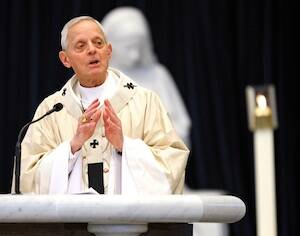In the wake of criticism from the Catholic Theological Society of America, Cardinal Donald Wuerl of Washington [pictured], chair of the U.S. Bishops’ Committee on Doctrine, sent a “resource” to bishops on April 18 “outlining the relationship between bishops and theologians.” Controversy has been brewing since a critique was released on March 24 of the book Quest for the Living God, by Elizabeth A. Johnson, C.S.J. The committee charged that the work was misleading and “does not accord with authentic Catholic teaching on essential points.” The C.T.S.A. countered that the bishops had misinterpreted Sister Johnson’s book and had ignored its own policies—for instance, by not first informally discussing its concerns with her. In the resource Cardinal Wuerl said that “it is the specific competence and responsibility of bishops to teach the faith in its entirety,” citing a 1992 statement of the doctrinal committee that bishops “are to determine authoritatively the correct interpretation of the Scripture and tradition committed to the Church...and they are to judge for the Church the accuracy of the presentation of this revelation by others.”
U.S. Bishops Defend Johnson Process
Show Comments (
)
Comments are automatically closed two weeks after an article's initial publication. See our comments policy for more.
The latest from america
Perhaps it is the hard-won wisdom that comes with age, but the Catholic rituals and practices I once scorned are the same rituals and practices that now usher me into God's presence, time and time again.
"Only through patient and inclusive dialogue" can "a just and lasting conflict resolution can be achieved" in the long-running conflict between Israelis and Palestinians, said the Holy See's permanent observer to the United Nations.
The ”Bad Guys” films ask, how do we determine who the “bad guys” are? And if you’re marked as “bad” from the start, can you ever make good?
In these dark times, surrounded by death and destruction in Gaza, we hear the command in the first reading, “Choose life.” What are the ways we can do this in a world that seems to have gone mad?








